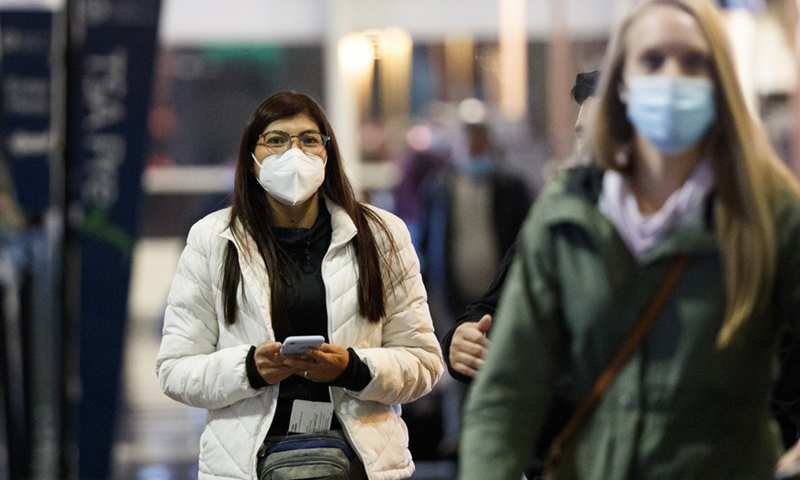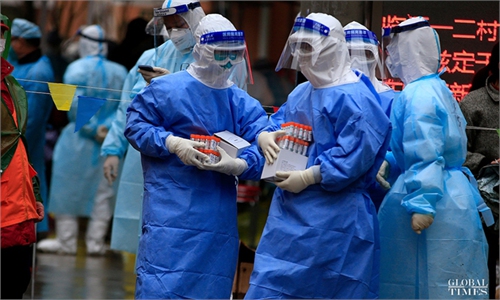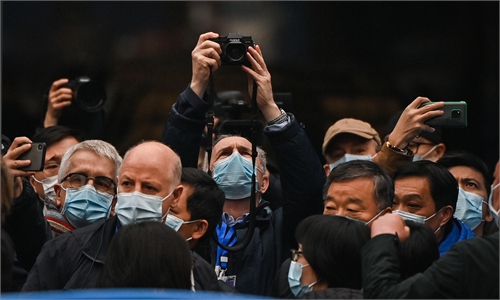US overdue mask mandate 'better late than never,' offers chance for cooperation with China over supply

Travelers wearing face masks are seen at Ronald Reagan Washington National Airport in Arlington, Virginia, the United States, on Dec. 23, 2020. (Photo by Ting Shen/Xinhua)
As the US Centers for Disease Control and Prevention (CDC) issued an order to come into effect on February 1 that requires mandatory mask wearing on interstate transportation and at transit hubs a year after the initial COVID-19 outbreak, Chinese netizens could not help but express their puzzlement: What took so long for the US to decide on such a simple yet effective measure to curb the deadly virus?
Experts reached by the Global Times said that while the order is long overdue, it is better late than never. The move is undoubtedly a breakthrough in the country's fight against the coronavirus, and if executed as planned, it will bring positive changes that could drag the US out of the crisis that has killed nearly 440,000 people, observers noted. However, it may still face some challenges along the way, especially from governors of states controlled by Republicans.
The US CDC issued the directive late on Friday local time following President Joe Biden's order for agencies to "immediately take action," which specified that masks must be worn in interstate transportation and at transit hubs, with the exemption of private cars or commercial trucks being driven by a sole operator.
The act has drawn over 91 million views on China's Twitter-like Sina Weibo as of press time, leaving confused netizens, who have grown accustomed to such rules under the new mode of life during the pandemic, stunned to find that the US, more than a year after the first cases were reported on January 22, 2020, was just about to implement mask-wearing rules.
"It took the US a year to follow the right examples set by others in fighting against COVID-19," one comment read.
Experts appreciated the effort as "better late than never," suggesting that mask wearing is still one of the most effective ways to cut off the source of infection. Coupled with mass vaccination which immunizes high-risk groups, the new move could lead to a positive turn in the pandemic situation, Wang Guangfa, a respiratory expert at Peking University First Hospital, told the Global Times on Sunday.
He stressed, however, that to curb virus spread, mask mandates must be applied together with other preventive measures such as limitations on group gathering.
Diao Daming, an expert on US studies at the Renmin University of China, pointed out that the federal order may face some challenges implementing at the state level, since some states are controlled by Republicans, who have expressed opposition to mask-wearing protocols as they did during the Trump administration. "Anti-virus measures are not simply an issue of public health, but they have become politicized," Diao said.
With the implementation of the mask mandate, the US' demand for protective masks is expected to surge, probably exceeding the country's capacity to supply them, which further calls for China and the US to cooperate on the matter more closely, Chinese analysts said.
China has provided the US with more than 42 billion masks, equal to nearly 127 per person since March 2020, Hua Chunying, spokesperson of the Chinese Foreign Ministry told a press conference in January.
https://www.globaltimes.cn/page/202101/1213626.shtml
The US reported 26,076,032 cases as of press time on Sunday with a death toll of 439,439, according to data from the Johns Hopkins University.


